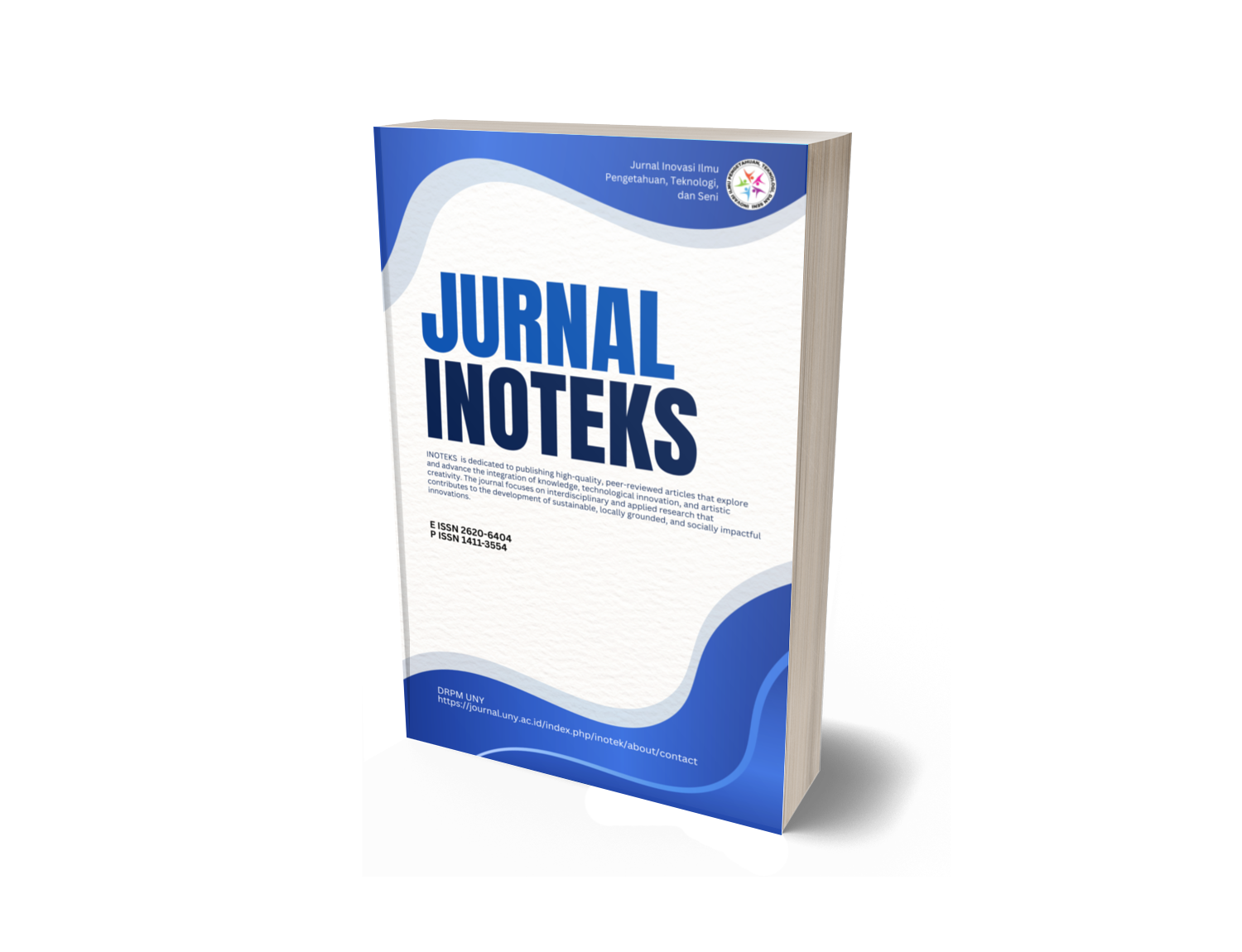Motivasi penggunaan media oleh guru untuk memperkuat pemahaman deep learning
DOI:
https://doi.org/10.21831/ino.v29i2.90315Keywords:
deep learning, game, media ajar, pelatihanAbstract
Sebagai bagian dari urun rembuk perguruan tinggi dalam konsep dosen bertugas di luar kampus, tim PkM merancang pelatihan penyusunan media pembelajaran berbantuan game bagi guru MGMP Bahasa Indonesia MTs di Kabupaten Bantul. Program berorientasi kinerja: penguatan konsep inti (deep learning, taksonomi Solo, rapid prototyping (tradisional-plus dan digital-ringan), simulasi/uji coba untuk umpan balik sejawat lalu pendampingan revisi hingga siap implementasi. Melalui pendekatan ini, diharapkan guru memiliki kerangka kerja yang operasional untuk merancang pengalaman belajar yang berpusat pada peserta didik, meningkatkan keterlibatan tiga dimensi, dan menumbuhkan kompetensi literasi yang lebih mendalam serta berkelanjutan. Pelatihan ini diikuti oleh 40 guru Bahasa Indonesia MTs se-Kabupaten Bantul dan dirancang sebagai program berbasis kinerja yang memadukan penguatan konsep, studio desain, simulasi/umpan balik, serta pendampingan implementasi. Metode pelatihan dilakukan dengan cara blended yang menggabungkan kegiatan secara daring dan luring. Pengelompokkan peserta dilakukan berdasarkan indikator lama mengajar, penguasaan teknologi informasi, dan kekerapan menggunakan media, serta tantangan penggunaan media dalam pembelajaran. Pelatihan penyusnan berhasil meningkatkan kapasitas psikologis mereka dalam menghadapi tantangan kerja. Peningkatan ini menunjukkan bahwa intervensi berbasis pengembangan kepribadian dan profesionalisme memiliki dampak positif terhadap kualitas. Namun, efektivitas pelatihan tidak hanya dapat dinilai dari hasil jangka pendek berupa peningkatan motivasi dan resiliensi, tetapi juga dari sejauh mana guru mampu mengimplementasikan perubahan tersebut dalam praktik pembelajaran dan interaksi sehari-hari. Berdasarkan uraian di atas, program pengembangan kompetensi profesional guru MTs harus dilakukan secara kontinyu dan sebaiknya diintegrasikan dalam sistem pendampingan berkelanjutan yang holistik.
References
Arsyad, A. (2011). BAB II KAJIAN TEORI A. Tinjauan Tentang Media Pembelajaran.
Eccles, J. S., & Wigfield, A. (2002). Motivational beliefs, values, and goals. Annual Review of Psychology, 53, 109–132. https://doi.org/10.1146/ANNUREV.PSYCH.53.100901.135153
Fullan, M., Foreword, M. L., & Barber, M. (2014). A Rich Seam How New Pedagogies Find Deep Learning. www.michaelfullan.ca
Kirkpatrick, D. L. (1994). Kirkpatrick, D. L. (1994). Evaluating Training Program—The Four Levels. San Francisco, CA Berret-Koehler Publishers, Inc. - References - Scientific Research Publishing. https://www.scirp.org/reference/referencespapers?referenceid=1735233
Krathwohl, D. R. (2002). A Revision Of Bloom’s Taxonomy Of Educational Objectives. Theory into Practice, 41, 302. http://www.citeulike.org/user/mapto/article/961573%5Cnhttp://www.mendeley.com/research/a-taxonomy-for-learning-teaching-and-assessing-a-revision-of-blooms-taxonomy-of-educational-objectives-abridged-edition-1/%5Cnhttp://www.amazon.ca/exec/obidos/redirect?
McClelland, D. C. (1967). Achieving Society - David Clarence McClelland - Google Buku. https://books.google.co.id/books?hl=id&lr=&id=Rl2wZw9AFE4C&oi=fnd&pg=PA1&dq=McClelland,+D.+C.+(1967).+The+achieving+society.+Free+Press.&ots=NJOkZhoGI1&sig=tsdrSDFoeiGe4dz8yXKVn8ucyKo&redir_esc=y#v=onepage&q&f=false
Pincus, J. D. (2023). The structure of human motivation. BMC Psychology, 11(1), 1–25. https://doi.org/10.1186/S40359-023-01346-5/TABLES/13
Plass, J. L., Homer, B. D., & Kinzer, C. K. (2015). Foundations of Game-Based Learning. Educational Psychologist, 50(4), 258–283. https://doi.org/10.1080/00461520.2015.1122533
Downloads
Published
How to Cite
Issue
Section
Citation Check
License
Copyright (c) 2025 INOTEKS: Jurnal Inovasi Ilmu Pengetahuan,Teknologi, dan Seni

This work is licensed under a Creative Commons Attribution-NonCommercial-ShareAlike 4.0 International License.
- Authors certify that the work reported here has not been published before and contains no materials the publication of which would violate any copyright or other personal or proprietary right of any person or entity.
- Authors transfer or license the copyright of publishing to Jurnal Civics: Media Kajian Kewarganegaraan to publish the article in any media format, to share, to disseminate, to index, and to maximize the impact of the article in any databases.
- Authors hereby agree to transfer a copyright for publishing to Jurnal Civics: Media Kajian Kewarganegaraanas a Publisher of the manuscript.
- Authors reserve the following:
- all proprietary rights other than copyright such as patent rights;
- the right to use all or part of this article in future works of our own such as in books and lectures;
- use for presentation in a meeting or conference and distributing copies to attendees;
- use for internal training by author's company;
- distribution to colleagues for their research use;
- use in a subsequent compilation of the author's works;
- inclusion in a thesis or dissertation;
- reuse of portions or extracts from the article in other works (with full acknowledgement of final article);
- preparation of derivative works (other than commercial purposes) (with full acknowledgement of final article); and
- voluntary posting on open web sites operated by author or author's institution for scholarly purposes, but it should follow the open access license of Creative Common CC BY-NC-SA License.








